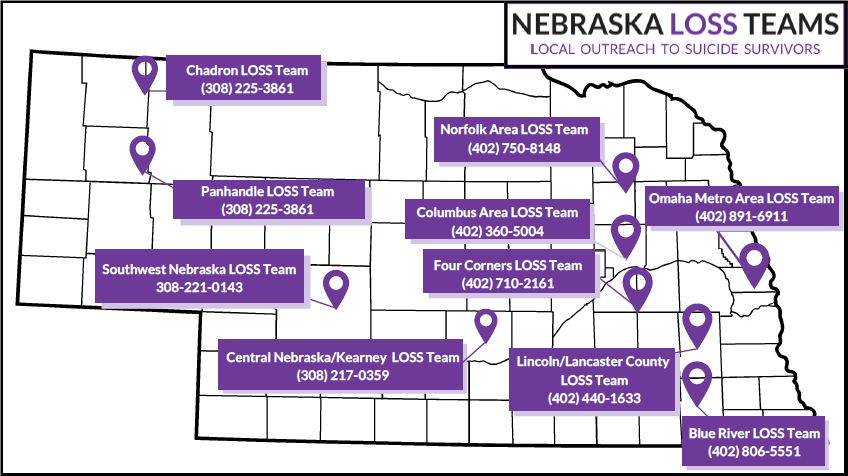CONTACT
Julie Naughton, Office of Communications, 402-471-1695 (office); 402-405-7202 (cell); julie.naughton@nebraska.gov
Lincoln – International Survivors of Suicide Loss Day was created to support survivors of suicide loss, or individuals who have lost loved ones to suicide. This year, International Survivors of Suicide Loss Day is on Saturday, November 21. Nebraska's Department of Health and Human Services recognizes this day and wants survivors of suicide loss to know that help is available for them.
Nebraska's Local Outreach to Suicide Survivors (LOSS) Teams consist of trained survivor and mental health professionals acting as volunteers to bring immediate support to survivors of suicide. Suicide survivors are those persons who have had a loved one complete a suicide and are at risk due to their emotional response, which may include the use of unhealthy coping strategies or attempting suicide themselves. Research has shown that survivors may experience increased levels of stress, depression, reduced coping capacity and prolonged grief.
The LOSS Team is activated by first response officials when a suicide occurs to provide resources, support, and hope to suicide survivors. The volunteers provide immediate assistance to survivors to help them cope with the trauma of their loss, provide follow-up contact with the survivors, and coordinate the utilization of services and support groups within the community.
“Programs such as LOSS can help survivors find hope and healing," said Sheri Dawson, director of the Division of Behavioral Health at DHHS. “By reaching out to a LOSS team, survivors are not only more likely to seek help for their own emotional response to the suicide, but are also at a significantly reduced risk to attempt or die by suicide themselves. The teams provide local resources for survivors and also offer a much-needed listening ear."
To reach a local LOSS team, visit http://nelossteam.nebraska.edu/. A map showing each area's information is also included below.
Have a friend who has lost a loved one to suicide, and are unsure of what to say? The American Foundation for Suicide Prevention offers the following advice.
- Say “I don't know what to say, but I'm here for you." Suicide loss is complicated, devastating, dumbfounding. There are no easy answers and no easy fixes. Be a patient, nonjudgmental listener. Be a safe place for the loss survivor to give voice to their emotions.
- Don't say, “I understand what you're going through" unless you too have lost a loved one to suicide. Because suicide loss is not like other losses, you cannot truly understand how the loss survivor is feeling. That's okay, and it's okay to acknowledge as much, too – it shows that you recognize the complexity of the loss survivor's grief and helps keep the conversation open.
- Do not ask questions about how the person died. If the loss survivor does not bring up the suicide method, assume they would prefer not to talk about it. Instead, offer a no-pressure invitation to talk.
- Avoid pat advice and hurtful clichés. Other than reminding the suicide loss survivor to take care of their basic self-care needs, avoid direct advice-giving; there is no right or wrong way to cope with a suicide loss. Remember that some of the common phrases we reach for when expressing our sympathies may be hurtful in that they minimize the magnitude of the suicide loss survivor's grief.
- Do not place value judgments on the suicide. Do not refer to the suicide as a selfish choice, an act of weakness, or a lack of faith or love or strength.
- Do not assign or imply blame. In trying to answer the question of why, suicide loss survivors often place blame on themselves. Be careful not to say things or ask questions that might suggest they're responsible for the suicide, whether directly or indirectly: Did they miss any warning signs? Did they fail to take the signs seriously? These questions may feed the self-recriminations with which the loss survivor is already struggling.
- Be proactive about offering help. People often find it hard to ask for help, or may not even know what kind of help they might benefit from, especially in the shock of the early days following a suicide loss. For that reason, a general “Let me know if you need anything" may not suffice. What everyday things that might be adding stress can you help with in the short term? Making concrete suggestions shows that your offer to help is genuine.
- Don't be afraid to talk about the person who died. Say their name as you would after any other loss. Give the loss survivor an opportunity to reminisce with you about the person they loved.
Need to talk or get immediate help in a crisis? Help is available. If you or a loved one need assistance, please reach out to:
- National Suicide Prevention Lifeline: 1-800-273-TALK (8255) for English, 1-888-628-9454 para Español
- Your faith-based leader, your healthcare professional, or student health center on campus.
- Nebraska Family Helpline – Any question, any time. (888) 866-8660
- Rural Response Hotline, (800) 464-0258
- Disaster Distress Helpline: 1-800-985-5990 (oprime dos para Español) or text TalkWithUs to 66746.
- National Domestic Violence Hotline: 1-800-799-7233 or text LOVEIS to 22522
- National Child Abuse Hotline: 1-800-4AChild (1-800-422-4453) or text 1-800-422-4453
- National Sexual Assault Hotline: 1-800-656-HOPE (4673)
Nebraska LOSS Team Map follows below.
###
